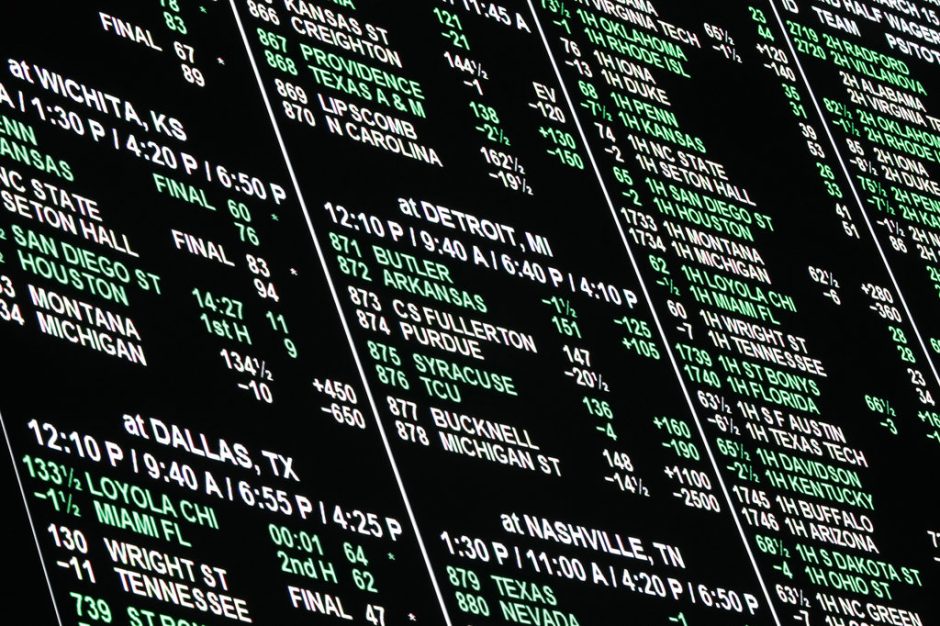There are dormant issues at the State Capitol, and then, somewhere between dormant and buried underground, there is legalizing sports betting.
(Note: A decision was made early in the reporting process to include no gambling puns in this story.)
On Tuesday, the Senate Taxes Committee rejected a proposal “to study, evaluate, provide recommendations and issue a report on the legalization of sports betting.”
The measure, not to legalize sports gambling but instead to study the possibility of one day maybe legalizing sports gambling, had been part of an omnibus tax spending bill.
The tax bill and other critical pieces of legislation to keep the state government operating are, more or less, stalled out as Gov. Tim Walz and legislative leaders hold closed-door negotiations on a two-year budget bill.
A budget will almost definitely not be finalized before the current end of the legislative session, which is this Monday, May 19. Missing the deadline means Walz must call a special session of the Legislature.
(Senate Majority Leader Erin Murphy, DFL-St. Paul, told reporters Wednesday that, “a special session is very, very likely if not inevitable.”)
Nonetheless, the Senate Taxes Committee made time to amend its bill before sending it back to the Senate floor.
Committee chair Ann Rest, DFL-New Hope, said legislation to legalize sports gambling was too preliminary to require the Taxes, Finance and Human Services committees to produce a study about the subject, as the provision required.

(Also, the House version of the tax bill asks for no such study.)
“This is a year of real uncertainty about how things are going to go forward,” Rest said at the meeting. “We had a lot of ‘I don’t know but it’s a good idea’ in the bills that came before us.”
And of these ‘I don’t know’ proposals, sports betting “continues to draw the most controversy,” Rest said.
Rest’s maneuver was bad news to Taxes Committee Vice Chair Matt Klein, DFL-Mendota Heights, who has sponsored multiple bills to legalize sports betting and last year was part of a group of lawmakers from both parties who worked out a deal to satisfy both tribal and horse racing track interests.
Related: Nearly untying the sports betting political knot was a rare example of the 2024 legislative session’s bipartisanship
Klein’s proposals included a measure to make sports betting legal at Minnesota’s 11 tribal nation sites, but still outlawed elsewhere, a proposal the Senate State Government Committee squelched in February.

Speaking right after Rest at the Taxes Committee hearing, Klein bemoaned that, “Once again, this year we are going to abandon Minnesotans who feel they have a legitimate right to sports wager on their mobile devices and are doing so already in abundant numbers on platforms that are unregulated, unsafe and predatory.”
By “refusing to move forward with even a study,” Klein said, “We are once again abandoning this year the 11 sovereign nations of this state who have declared to us this is their top priority.”
After his remarks, Klein cast a look around the committee room and asked if anyone else would like to speak up against the Rest amendment. No one said a word, and the amendment passed by a voice vote.
Why efforts to legalize sports betting keep failing
That each attempt to legalize sports wagers dies on arrival is somewhat unusual.
Since the 2018 Supreme Court decision that let states decide whether to permit such betting, 38 states have legalized sports gambling, with 30 of those allowing wagers to be placed directly from a mobile device.
Televised football and basketball contests are saturated with reminders that fans (so long as they live in the right state) can place bets on apps like DraftKings or FanDuel before and during games.
The National Conference of State Legislatures did, however, note in a March study that “the frenzy around sports betting expansion has slowed, and legislators are shifting their attention towards state revenues.”
The politics of sports betting in Minnesota includes debates on whether to make gaming exclusive to tribes, and how to incorporate state-licensed racetracks, which presently have cornered the state’s legal sports gambling market.
Related: Sports betting’s latest foe: skepticism of sports books, big tech
Also, some lawmakers say permitting gambling would only exacerbate the aforementioned predatory platforms.
“Every single one on our phones, from the notifications to the endless scroll functions, were modeled after the most addictive parts of gambling,” Sen. Erin Maye Quade, DFL-Apple Valley, said at the February State Government Committee hearing.


